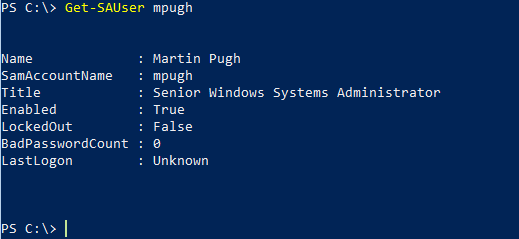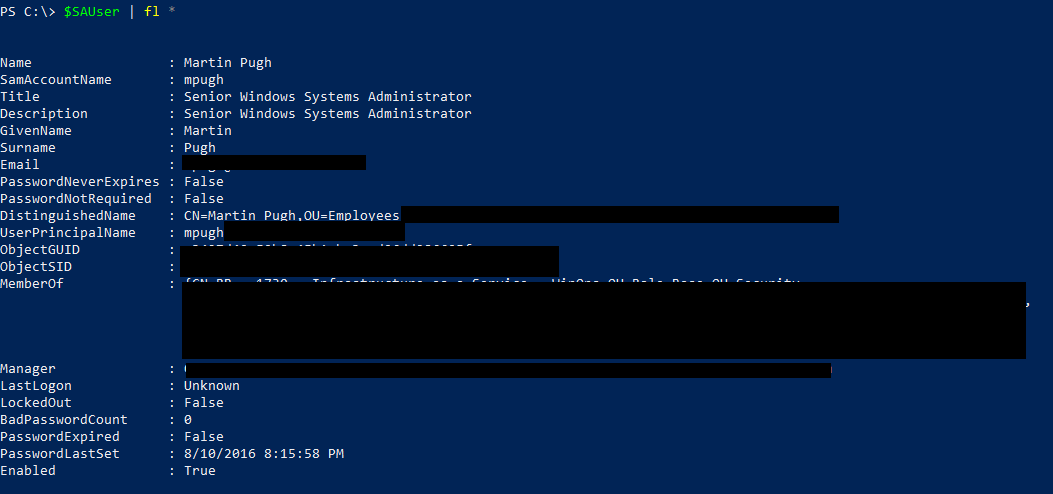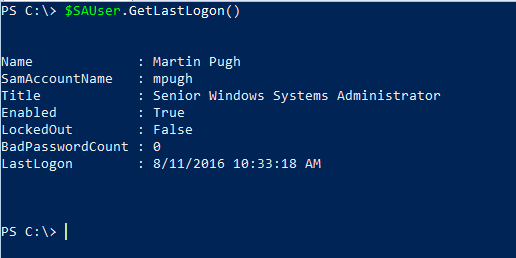martin9700 / Simpleadadmin
Programming Languages
Labels
Projects that are alternatives of or similar to Simpleadadmin
SimpleADAdmin
The idea behind SimpleADAdmin was to provide a single function to do your most common administrative tasks. When managing users on a day to day basis what do we do? Reset passwords, unlock accounts, add and remove from groups and do some forensics about why they locked out in the first place. All of this can be done from Get-SAUser. A new addition is Get-SAGroup which allows you to do similar things with Active Directory groups (see below).
Current functions available in SimpleADAdmin
| Function | Description | Global Variable |
|---|---|---|
| Get-SAUser | Manipulate user objects | $SAUser |
| Get-SAGroup | Manipulate groups | $SAGroup |
| Get-SADomain | Display domain information, including detailed site information | None |
| Get-SADomainController | Discover domain controllers, and their roles | None |
$SAUser
Get-SAUser creates a global variable called $SAUser, and this is where all the magic happens. After running Get-SAUser, it will display some basic details about the user (and a better default set then what Get-ADUser gives you) and populate the $SAUser variable. There is a lot more data in $SAUser then the default view, but I wanted to keep it simple. You use methods assigned to $SAUser to make changes (see below).
Methods
AddGroup
Usage: $SAUser.AddGroup("NameOfGroup")
Description: Add the user to a group.
Overload: You can add the name of a group in the overload and the function will find all groups that match that name pattern and let you
select which group or groups you want to add. If you give an
exact match it will just add it without prompting.
FindLockout
Usage: $SAUser.FindLockedout()
Description: Will go to the PDC emulator and look for event ID 4740 (lockout)
in the Security Event Log.
Overload: None
GetGroups
Usage: $SAUser.GetGroups()
Description: The "MemberOf" field will always show what groups the user is in,
but it's the FQDN. Use the GetGroups() method to see just their
Name.
Overload: You can add an overload to filter the result:
$SAUser.GetGroups("test")
GetLastLogon
Usage: $SAUser.GetLastLogon()
Description: Will go out to all domain controllers in your domain and locate
the latest logon for the user.
Overload: None
RemoveGroup
Usage: $SAUser.RemoveGroup("NameOfGroup")
Description: Remove the user from the specified group.
Overload: Name of the group, or closest match. If you specify the exact name,
or the filter data you provide only has one match thenthe user will
be removed from the group without prompt. If there are more then
one match you will be asked to select the group or groups you want
to remove.
ResetPassword
Usage: $SAUser.ResetPassword()
Description: Method will then prompt for new password
Overload: None
Unlock
Usage: $SAUser.Unlock()
Description: Will unlock the user account
Overload: None
Get-SAGroup
Get-SAGroup works just like Get-SAUser, only focused on groups. A global variable call $SAGroup is created, which also features a number of methods for working with the group.
Methods
GetMembers
Usage: $SAUser.GetMembers()
Description: Shows every user and group who is a member of the group.
Overload: None
GetMembersRecursive
Usage: $SAUser.GetMembersRecursive()
Description: Shows every user who is a member of the group, even if they are
part of a group that's assigned to this one.
Overload: None
AddMember
Usage: $SAUser.AddMember(SamAccountName)
Description: Add the designated user to the group
Overload: SamAccountName for the user you want to add
RemoveMember
Usage: $SAUser.RemoveMember(SamAccountName)
Description: Remove the designated user to the group
Overload: SamAccountName for the user you want to remove
Dynamic Updates
One of the unique capabilities of both $SAUser and $SAGroup is the fact that all the properties in them will dynamically update every time you display the variable. You'll be able to monitor your changes in real time.




